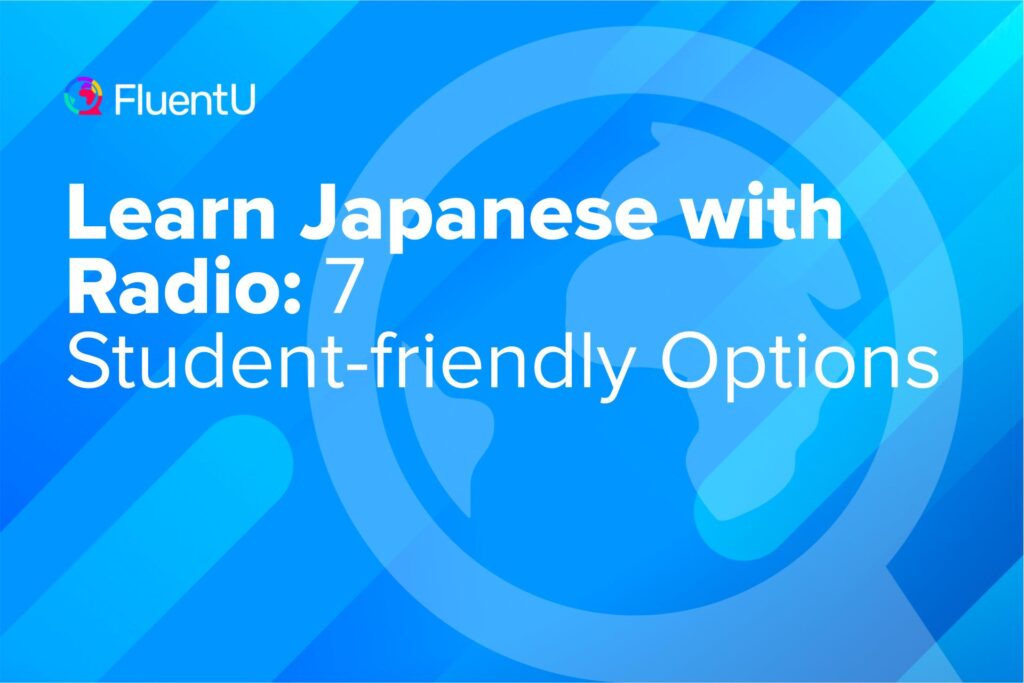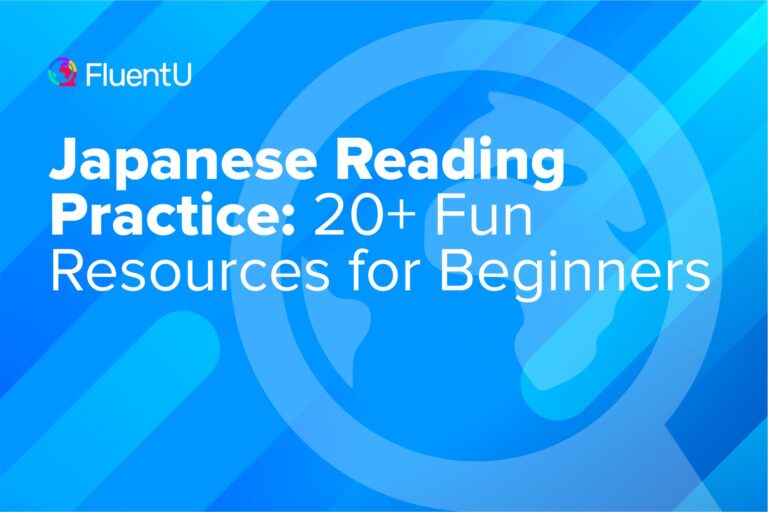Learn Japanese with Radio: 7 Student-friendly Options

In this day and age, radio has unfortunately become somewhat forgotten, but it has its own unique benefits. It’s an easy way to immerse yourself in aspects of Japanese culture you may miss elsewhere.
There are even some radio stations that offer features especially of interest to Japanese learners. So go ahead and take a look at these Japanese radio resources I picked out for you.
Download: This blog post is available as a convenient and portable PDF that you can take anywhere. Click here to get a copy. (Download)
1. Radio Kishiwada (ラヂオきしわだ/らじお きしわだ)
The first one on our list, as well as my personal favorite, this radio station from Osaka gives off a great vibe and it never gets boring. It is from Osaka, after all, so I guess they don’t even know how to be boring there.
Anyway, the station concept is something like community radio, and it has a wide variety of shows that broadcast daily. You get to listen to talk shows, music shows, news and more.
To summarize, this station is helpful for Japanese learners because of these three things:
- First, you get to hear some Osaka dialect. Not a lot, but you’ll hear it here and there, and trust me, you’ll gain from it.
- Second, you get to hear both formal and informal talking. Formal in news and informal in some talk shows.
- And third, you get to enjoy listening to a lot of jokes and gags. Osaka people are known as jokers, so they can’t really help it. Knowing cultural traits and understanding them is a big part of learning a foreign language, and that means adopting a different sense of humor is important as well.
As far as recommended shows go, I’d suggest listening to this station from around 7 A.M. to about noon, Japanese time. That way, you’ll get to listen to news, talk and some music as well. Great for expanding your vocabulary!
You’ll also get a chance to hear how Japanese people speak English, since one show plays only good old American jazz records! I won’t tell you the airing time for this one, though, just so I can leave you with a small surprise.
The best part about this station is the fact that you can listen to it anywhere at any time, as long as you have an internet connection.
2. FM Hashimoto (FM はしもと)
Also known as 816.fm, this one is something exceptional. The station seems to be there just for you to benefit from it. From shows that help you study, to shows that cheer you on to follow your dreams. Honestly, I haven’t heard anything else like it.
Like most Japanese radio stations, this one plays only music at night, with regular broadcasting during the day. I suggest listening to this one from around 10 A.M. to about 3 P.M. Japanese time. Every day is a little different, but the shows are mostly about relaxation and self-improvement. You can see the timetable here.
Also, from Monday to Friday at 7:45 A.M. and 5 P.M. they broadcast a short English lesson, called ひとみのワンポイント英会話 (ひとみの わんぽいんと えいかいわ), or “Hitomi’s One Point English Conversation,” which can be helpful for those of us who study Japanese.
In order to listen to this one on your phone, you’ll have to download a third-party app. I suggest using this one, since it’s free and very reliable.
However, you can also listen to it on a computer from this link without any problems at all. You just have to click the NETラジオ (NET Radio) button, and then the パソコンで聞く(Listen on PC) button.
3. Chupea (FM ちゅーピー/FM ちゅーぴー)
Chupea is pretty much the same type of radio station as Kishiwada. They broadcast news, talk shows, music and so on.
So why did we put two similar stations on this list?
They aren’t exactly identical, that’s why.
The first difference between them is very simple: Kishiwada is from Osaka and Chupea is from Hiroshima. These dialects are different and knowing both of them is very helpful for Japanese learners. Japan is full of different kinds of dialects and plenty of them are extremely difficult to understand. However, these two are among the not-so-hard ones and you can learn them in time.
The second difference, also helpful for those of us who study Japanese, are two shows Chupea has: One is for people over 50 years old, and the other one is for young people, mostly teenagers.
- The first show airs on Mondays at 5 P.M. and is called R-50 オトナのしゃべり場 (R-50 おとなの しゃべりば), or “R-50: A Place for Grownup Talk.” The subjects they cover in this show are related to middle-aged life.
- The other one airs on Fridays at 5:30 P.M. and is called にかもとりかの「おれんじかのん」, or “Nikamoto Rika’s Orange Canon.” Yeah, honestly I have no idea what the deal is with that name. Anyway, it’s a show about anime culture and things related to it.
Try listening to both of them in order to notice the difference in vocabulary, grammar and mentality between young person talk and middle-aged person talk.
You can listen to the stream on their official website even from your phone.
4. Asia Dream Radio (アジアドリームラジオ/あじあ どりーむ らじお)
This one is a little bit different from the others on our list. It’s not a normal radio station but instead a resource that lets you listen to Japanese music.
Choose between pop, rock, “cute” music, popular music in Japan, Japanese club music, classical Japanese music or “blossom season-themed” music, whatever that is. Once you choose, the music starts playing.
Even though it doesn’t have talk shows, news, etc., this resource is still beneficial for Japanese learners since you can learn a lot of words just from listening to song lyrics. Not only that, but you can also remember lyrics more easily than other language formats later on—just remember the tune and the melody, and the words will come along with it.
5. NHK (R1, R2, FM)
You may already know about NHK and their radio stations. NHK is Japan’s national public broadcasting organization. That means that their stations cover news, talk shows, educational programming, entertainment and so on.
Right now, though, we’ll be introducing you to a special feature that’s especially great for learners: their online Japanese lessons!
At this link, you can find 48 amazing lessons that depict everyday situations involving Anna, a schoolgirl in Japan. Each lesson has written-out dialogues you can listen to, grammar explanations and a recording with explanations in English. You can also do a quiz or a review, check out the hiragana and katakana list, play back some words and more.
6. Kyoto Living FM (京都リビング FM/きょうと りびんぐ FM)
This one is on our list for one reason and one reason only. The magnificent enka, or traditional-style popular ballads that are so beautiful to listen to.
Tune in any day at around 6 P.M. Japanese time to enjoy this amazing and wonderful musical art. This one is all about enjoying some fine art, because everyone needs a break from studying once in a while!
In order to listen to this station you’ll need a computer. Find the station on this list and start your relaxation therapy!
7. Radio Nikkei
The Nihon Keizai Shimbun (日本経済新聞/にほんけいざいしんぶん), more familiar by its abbreviated name, The Nikkei (日経/にっけい), is the world’s most widely circulated economic newspaper.
Relatively few people outside Japan are aware that The Nikkei also has a subsidiary radio service, and its excellent programs are by no means limited to economic topics—although there are of course plenty of those as well, beginning with the daily headline recap bulletin “聴く日経ヘッドライン” (きく にっけい へっどらいん).
With podcasts freely available online, learners of Japanese can enjoy access to some truly excellent listening content on topics that no other broadcaster seems to venture into. Another advantage is that the website usually keeps its listening materials accessible in the archive, so you can listen to programs that were originally broadcast several years back.
Just a technical note first: Listening to the programs is possible either directly on Nikkei’s on-demand listening website, or by downloading podcasts on iTunes through the link provided at the top of the website’s main page.
If you listen directly on the website, note that access to the episodes is done not from the descriptions that you see at the center of the page but through a sidebar with the title “今すぐ聴く!オンデマンド (いますぐきく!おんでまんど/Listen Now! On Demand).
When you’re on a program’s page, find the sidebar on the right and click on the episode you’d like to listen to—they’re arranged by date in descending order, with the most recent broadcast shown first.
Listening to radio in a foreign language can be somewhat difficult, especially for new learners, but don’t get discouraged. You can always work your way up to Japanese radio if you don’t feel quite ready yet, starting with easier listening resources like dual-language podcasts and Japanese YouTube videos with English closed captioning options.
Another resource that can help build your listening skills is FluentU, since this online Japanese program has a diverse collection of native media clips.
FluentU takes authentic videos—like music videos, movie trailers, news and inspiring talks—and turns them into personalized language learning lessons.
You can try FluentU for free for 2 weeks. Check out the website or download the iOS app or Android app.
P.S. Click here to take advantage of our current sale! (Expires at the end of this month.)

With all the above resources, you’ll be on your way to improving your listening skills in no time.
Download: This blog post is available as a convenient and portable PDF that you can take anywhere. Click here to get a copy. (Download)
And One More Thing...
If you love learning Japanese with authentic materials, then I should also tell you more about FluentU.
FluentU naturally and gradually eases you into learning Japanese language and culture. You'll learn real Japanese as it's spoken in real life.
FluentU has a broad range of contemporary videos as you'll see below:

FluentU makes these native Japanese videos approachable through interactive transcripts. Tap on any word to look it up instantly.

All definitions have multiple examples, and they're written for Japanese learners like you. Tap to add words you'd like to review to a vocab list.

And FluentU has a learn mode which turns every video into a language learning lesson. You can always swipe left or right to see more examples.

The best part? FluentU keeps track of your vocabulary, and gives you extra practice with difficult words. It'll even remind you when it’s time to review what you’ve learned. You'll have a 100% personalized experience.
Start using the FluentU website on your computer or tablet or, better yet, download the FluentU app from the iTunes or Google Play store. Click here to take advantage of our current sale! (Expires at the end of this month.)







